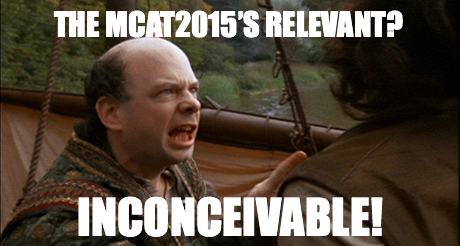The MCAT2015: It’s Relevant and Reflects the Changing Medical Environment
- by
- Mar 27, 2015
- Reviewed by: Amy Rontal, MD

 “What does this have to do with being a doctor?”
“What does this have to do with being a doctor?”
“How will knowing this help me treat patients in the future?”
“Will I ever use any of these things in medical school?”
Prior to the last administration of the “old” MCAT exam, students studying for the test raised these types of questions. And they were all too often fair questions.
But how does one really assess the relevancy of a standardized test?
Broadly speaking, the MCAT—the standardized exam all aspiring medical students must take—has two major purposes:
Firstly, the MCAT enables a comparison of the academic and intellectual abilities of students who come from different universities, or who have taken very different classes. These inter-university and inter-major differences make GPA comparisons an insufficient metric for determining students’ academic ability. This aspect of the test, to a certain extent, is independent of the material tested, and instead focuses on skills such as inductive and reasoning ability, logic and critical thinking skills.
The second purpose of the MCAT is to specifically assess students’ abilities in the science basics believed to be a necessary foundation for building medical knowledge.
The “new” MCAT makes major improvements in the relevancy of both of these aspects of the exam.
In comparison to the old exam, the MCAT2015 uses various studies and scientific figures within passages at a much higher rate.
Rather than providing ideal scenarios in which students can utilize memorized equations, the exam now forces test-takers to critically consider more realistic scenarios and to apply scientific knowledge to answer questions.
With the knowledge that all physicians can now access instantaneously due to Wikipedia (not to mention the planned arrival of IBM’s Watson), memorization of facts and even application of difficult concepts in ideal scenarios is becoming less important. Instead, the ability to reason through scientific studies is growing in importance. The new test reflects this changing medical environment.
Test takers will also notice differences both in content and the manner in which particular content is tested.
There have been significant changes in the actual tested content. Much of the dreaded organic chemistry is being phased out while biochemistry is being focused on more heavily. More noticeably, an entire section of this test will now be devoted to psychology and sociology.
As the medical field has evolved over the past couple of generations, there has been an increased understanding that a strictly biomedical approach leads to sub-optimal outcomes. Many medical schools have begun to reflect these changes in their pre-clinical preparation, including coursework on the sociology of health care. The new exam has been revised to reflect this.
Additionally, there have been changes in how particular content is tested. In the old MCAT, many passages were often far removed from the biomedical and psychosocial milieu in which physicians generally spend their time. Now, many basic physics and chemistry concepts are tested within the “biological” environment that physicians need to be comfortable in.
There is no question that the AAMC has changed the MCAT in many ways in its quest to make the exam more relevant to medical education. One of the biggest changes might just be the decreased number of times MCAT students find themselves asking, “Why would I ever need to know this as a physician?” This is a change that will undoubtedly be welcomed by all aspiring physicians.









